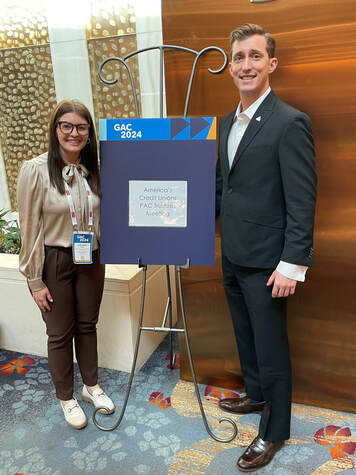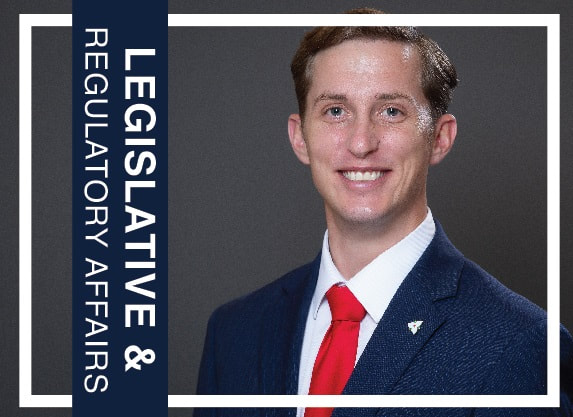 John Alexander and Chesney Garnos at the GAC PAC Trustees meeting last week. John Alexander and Chesney Garnos at the GAC PAC Trustees meeting last week. by John Alexander, Director of Legislative & Regulatory Affairs Dakotas Crush Fundraising Records: A GAC Celebration to Remember In an electrifying display of solidarity and purpose, this year's Governmental Affairs Conference (GAC) not only lived up to expectations but far exceeded them, painting the week with remarkable achievements, spirited collaboration, and a fundraising extravaganza that has set new benchmarks for America's Credit Unions. The GAC week culminated in a phenomenal rally for the PAC Sweepstakes, amassing an awe-inspiring grand total of $315,006 in just five days. Leading the charge with unyielding passion and an exemplary spirit of generosity, California soared high, contributing over $50,000, a testament to their unwavering dedication. The preliminary state rankings, spotlighting online donations, have been unveiled, setting the stage for next week's final tally, which promises to incorporate both online and in-person contributions. This year’s approach, marrying traditional and innovative fundraising tactics, signifies a pivotal moment in our collective journey. In a thrilling announcement, Scott Schwindt from Western Cooperative CU in North Dakota has been named the “Day 4 Sweepstakes Winner,” encapsulating the spirit of luck and fortune that graced the event. With the Grand Prize and other prizes awaiting their reveal next week, anticipation is at an all-time high. But the waves of success didn’t stop there. North Dakota and South Dakota, in a show of unprecedented unity and effort, raised a combined total of $12,025 in four days, smashing previous records and marking a staggering 53% increase in fundraising. This achievement is not just a number—it’s a beacon of hope, a source of pride, and a clear indicator of the potential we harness when we come together. This milestone underscores the pivotal role the Dakotas play in the broader landscape of federal fundraising. By March, we’re already charting nearly half or more of our annual target—a clear sign of the momentum we've built and the path we're blazing forward. In recognition of these monumental efforts, we are excited to announce the upcoming “Stack the PAC” event, a special occasion designed to honor our esteemed contributors and celebrate our collective triumphs. Scheduled for 7:30 p.m. to 9 p.m. on Tuesday, May 14th during our Annual Summit, this exclusive gathering is set to feature insights from Trey Hawkins, Deputy Chief Advocacy Officer of Political Action at America’s Credit Unions, as well as prestigious awards and recognition for our distinguished advocates and contributors. As we look toward the “Stack the PAC” celebration, let’s take a moment to reflect on the power of unity, the strength of our convictions, and the boundless possibilities that lie ahead. The Dakotas have not only set a new standard for fundraising but have also reignited the flame of advocacy, reminding us of the impact we can make when we stand united. Thank you, Dakotans, for your incredible contribution, your boundless energy, and your unwavering commitment. This isn't just a win for the Dakotas; it's a victory for all of us, fueling our journey towards a future where our collective voice is stronger, our actions more impactful, and our resolve unbreakable. Here's to making history, together. New Rule Shakes Credit Unions: $10 Billion in Late Fee Cuts Could Spell Trouble In a decisive move by the Consumer Financial Protection Bureau (CFPB), a new rule aimed at slashing excessive credit card late fees was finalized today, marking an end to a loophole previously exploited by large credit card issuers. This regulation, designed to cut down on fees that annually siphon over $14 billion from American families, promises substantial savings. By reducing the typical late fee from $32 to $8, it is estimated that American families will conserve more than $10 billion yearly, averaging a savings of $220 annually for over 45 million people subjected to these fees. The impetus for this rule traces back to concerns over credit card companies developing a business model primarily focused on penalties, fee harvesting, and misleading tactics. The Credit Card Accountability Responsibility and Disclosure Act of 2009 (CARD Act) was a congressional response to these practices, imposing restrictions on excessive penalty fees and establishing clearer consumer protections. However, a provision issued by the Federal Reserve Board in 2010 provided a loophole by setting a fee cap that has since increased due to inflation, despite the shift to more cost-effective digital processes by credit card companies. The new CFPB rule specifically targets large card issuers, defined as those with over 1 million open accounts, which represent the bulk of the credit card market. It not only lowers the permissible late fee to $8, eliminating automatic annual inflation adjustments, but also requires issuers to justify any higher fees by demonstrating actual collection costs. This move is expected to pressure credit card companies to encourage on-time payments rather than relying on late fees as a significant profit source. For credit unions, particularly smaller ones that might already be operating with tighter margins, this rule presents several challenges. Plausible scenarios include:
This rule is a significant step by the CFPB to foster fairness in the credit card market, ensuring that consumers are not unduly burdened by excessive fees while still allowing issuers to cover legitimate costs. As the financial landscape adapts to this change, credit unions will need to navigate the challenges it presents, balancing the need for compliance with the imperative to remain competitive and financially healthy. The rule's effective date will be 60 days following its publication in the Federal Register, marking a new chapter in consumer financial protection and the credit card industry's operations. For more detailed information on the CFPB's new rule, visit www.consumerfinance.gov. Act Now! Regarding the Credit Card Competition Act, your efforts and advocacy are crucial. We strongly urge you to contact lawmakers today and emphasize that this interchange bill must not be included or attached to any forthcoming funding bills or the National Defense Authorization Act (NDAA). It's critical that all credit unions mobilize both employees and members to address this interchange issue, ensuring our collective voice is unmistakably heard. Act now to protect the interests of credit unions and their members. As always, DakCU members are encouraged to contact John Alexander with any advocacy or regulatory concerns. Comments are closed.
|
The MemoThe Memo is DakCU's newsletter that keeps Want the Memo delivered straight to your inbox?
Archives
July 2024
Categories
All
|
|
Copyright Dakota Credit Union Association. All Rights Reserved.
2005 N Kavaney Dr - Suite 201 | Bismarck, North Dakota 58501 Phone: 800-279-6328 | [email protected] | sitemap | privacy policy |





